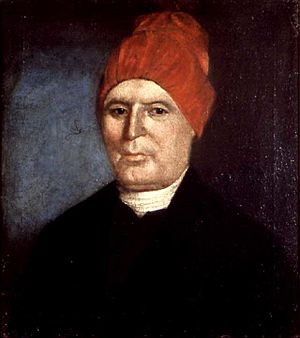Samuel Hopkins (theologian) facts for kids
Quick facts for kids
Samuel Hopkins
|
|
|---|---|
 |
|
| Born | September 17, 1721 |
| Died | December 20, 1803 (aged 82) |
| Nationality | American |
| Occupation | Theologian, abolitionist |
| Signature | |
 |
|
Samuel Hopkins (born September 17, 1721 – died December 20, 1803) was an important American Congregationalist thinker and minister. He lived during the time when the United States was becoming its own country. A special way of thinking about religion, called Hopkinsian theology, was named after him. Samuel Hopkins was also one of the first people to speak out against slavery, saying that the U.S. should free all enslaved people.
Contents
Early Life and Education
Samuel Hopkins was born in 1721 in Waterbury, Connecticut. He was named after his uncle, who was also a minister. Samuel went to Yale College and finished his studies there in 1741. After college, he studied to become a minister with a famous thinker named Jonathan Edwards in Northampton, Massachusetts. By 1742, he was allowed to preach.
His Work as a Minister
In December 1743, Samuel Hopkins became the pastor (leader) of a church in a small town called the North Parish of Sheffield (now Great Barrington) in Housatonic, Massachusetts. This town had only about 30 families. He worked there for many years, from 1743 to 1769. However, some of his ideas about religion caused disagreements, and eventually, he had to leave that church.
From April 1770 until he passed away in 1803, Hopkins preached at the First Congregational Church in Newport, Rhode Island. During the American Revolutionary War, when the British army took over Newport from 1776 to 1780, Hopkins moved around and preached in other towns like Newburyport, Massachusetts, and Canterbury and Stamford, Connecticut.
In 1802, Yale University gave him a special honor, a Doctor of Divinity degree. He died in Newport on December 20, 1803.
His Theological Ideas
Samuel Hopkins, along with Jonathan Edwards and Joseph Bellamy, helped create a new way of thinking about religion. It was sometimes called the New Divinity or New England Theology. This way of thinking was a type of Calvinism, which is a branch of Protestant Christianity. It became very important in New England and influenced a big religious movement called the Second Great Awakening.
Hopkins is known for a phrase called "disinterested benevolence". This idea means doing good things for others without expecting anything in return for yourself. It's about truly wanting to help people because it's the right thing to do, not for personal gain.
Fighting for Freedom: Abolitionism
Even though Samuel Hopkins owned some enslaved people, like many others in New England at the time, he became one of the first ministers to speak out strongly against slavery. His church was among the first religious groups in America to openly preach against the enslavement of African people.
In 1774, Rhode Island passed a law that stopped new enslaved people from being brought into the colony. Hopkins then wrote a powerful pamphlet in 1776 called "A Dialogue Concerning the Slavery of the Africans." In this writing, he called enslaved people "our brethren and children" and said it was the duty of the United States to free them. He believed it was also in the country's best interest to do so.
After the American Revolution, in 1784, Rhode Island passed another law. This law said that all children born to enslaved mothers after March 1785 would be free. Following this, Hopkins suggested sending a small group of African Americans to Africa. His idea was for them to share their Christian faith with people there. He had even started a school in Rhode Island to train African American missionaries, but the war stopped it. Later, a successful African American businessman named Paul Cuffee was inspired by Hopkins's ideas and tried to help African Americans settle in Sierra Leone in Africa.
His Lasting Impact
A famous writer named Harriet Beecher Stowe, who wrote Uncle Tom's Cabin, greatly admired Samuel Hopkins. She even included him as an important character in one of her other books, The Minister's Wooing (1859). This shows how much his ideas and actions, especially against slavery, were respected and remembered.
 | Toni Morrison |
 | Barack Obama |
 | Martin Luther King Jr. |
 | Ralph Bunche |

